Bollywood Inquiry December 2019: PATI PATNI AUR WOH, PANIPAT, MARDAANI 2, DABANGG 3 & GOOD NEWWZ

Musanna Ahmed is a freelance film critic writing for Film…
Bollywood Inquiry is a monthly column on the biggest new Bollywood movies. Disclaimer: I may not have seen all of the past month’s globally released features, for varying reasons.
Pati Patni Aur Woh (dir. Mudassar Aziz)
This is a remake of a homonymous 1978 comedy of a man torn between his wife and another woman that doesn’t play so well today, a good enough reason to warrant a contemporary take on the tale. It’s worth the retread as the new Pati, Patni Aur Woh updates the story with neoteric ideas on masculinity and relationships in addition to good humour, suspense and star power. Even if the overall sentiments of Pati, Patni Aur Woh are essentially “you go girl”, it’s appreciated at a time when misogynistic films like Kabir Singh continue to flourish.
The concept of the modern middle class Indian man is brilliantly scrutinised through protagonist Abhinav “Chintu” Tyagi (Kartik Aaryan), a rather entitled, self-absorbed, “why always me” brat who can never appreciate a good thing when it’s right under his nose. Case in point – his maths teacher wife Vedika (Bhumi Pednekar) who understands the compromise of space and time required in marriage, fighting against the possibility of it crumbling when she suspects her husband may be up to no good.
It’d be hard to suspect Chintu would cheat, considering both the stability of their relationship and also his somewhat betaness; a scrawny figure sporting a mustache in an attempt to look more mature than he actually is, with a high pitched giggle as his signature tic. Then there’s the arrogance behind the desk of his government job, as if a good salary permits him to refuse looking up from the computer to properly greet incoming guests.
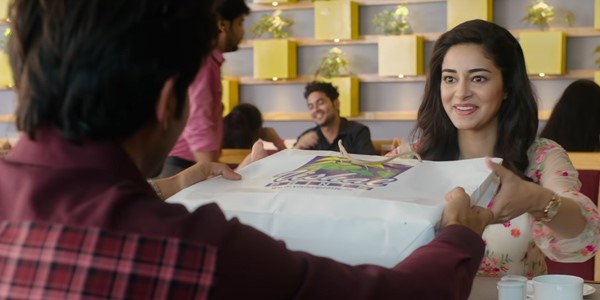
The one time he does, a beautiful woman extends her hand – Tapasya (Ananya Pandey), a cordial, fresh-faced entrepreneur who needs bureaucratic guidance for a local project. Their time together sparks romantic feelings and she believes him when he says he’s in the realm of singledom. The rest of the movie deals with him trying to avoid getting caught in the lie. Hardly an original premise but one that can still offer surprises, most notably the progressive twist in the wonderfully satisfying climax.
Chintu delivers an absurd monologue where he decries male oppression, self-diagnosing himself as a man suffering from supposedly biased expectations in a relationship, which pays off well when he gets his comeuppance. In this Pati, Patni Aur Woh, the man doesn’t get away with his lies and the women don’t merely exist to provide a balance for his character – the original film, with its limited view of women, simply shrugged its shoulders and said men will be men.
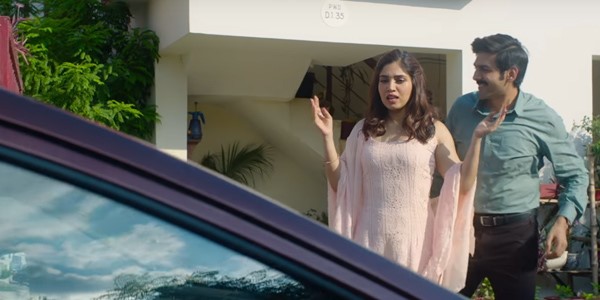
As for the star trio, Ananya Pandey is the biggest surprise. Her tired Mean Girls shtick in the terrible Student of the Year sequel suggested little hope for her future, but here she’s eminently likeable as the self-aware third party. Bhumi Pednekar imbues the light-hearted film with heavyweight emotions in a sympathetic turn as the hardworking Vedika.
Kartik Aaryan befits the role of an eccentric man susceptible to making bad decisions and being punished for them and I like him for accepting the role – certain other actors wouldn’t allow themselves to go through the same arc. Ayushmann Khurrana’s brother Aparshakti shares the same comedic gifts as his brother, proving to be a reliable supporting act in his role as Chintu’s good friend Fahim. Good work all around.
Panipat (dir. Ashutosh Guwariker)
In the noughties, Guwariker might have been the most envied director in the Hindi industry after directing three terrific epics: Lagaan, Swades, Jodhaa Akbar. Lagaan is one of the very few Indian movies to have ever been nominated for an Oscar and I count it as a personal favourite of mine too. As another decade in the director’s career comes to a close, Panipat signals a decline, an attractively packaged but superficial war epic based on the 1761 battle between the Maratha Empire and the Afghan army.
Panipat plays like an “Indian History for Dummies”, plotting out the 18th century war between the factions like a snakes and ladders game, lacking any nuance in the political depiction beyond territorial dispute and greed for gold. As with Kesari, Padmaavat and several other features that have been and will continue to be made in Modi’s India, Panipat is essentially another brush stroke in the bigger picture being painted in Bollywood cinema of Hindus vs Muslims.
Personal sentiments on contemporary Hindutva nationalism aside, why the subtext hurts the movie is because the potential of delving into the rich political, economic, linguistic and social histories of both the Maratha and Durrani Empires is squandered in favour of a black and white conflict between clear-cut heroes and villains that we’ve all seen before.
Furthermore, there’s an exhaustive amount of detail in the sets and clothing, so much so that the research into the screenplay comes off as negligent in comparison. If the Oscars weren’t a “local festival”, as Bong Joon-Ho casually described them earlier this year, Panipat would receive nominations for production design and costumes.
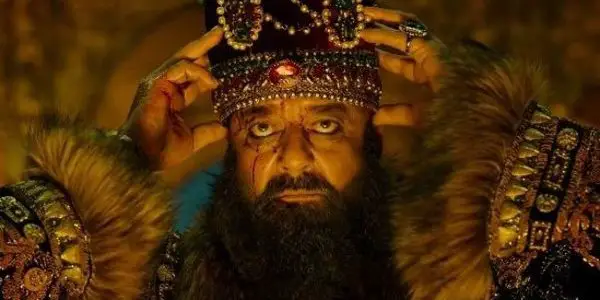
Alternately, if there was a bigger emphasis by Hindi film bodies for such craft – IIFA ceased their art direction award two years ago – then Panipat would be one of the most nominated films of the year. Such care is put into fitting each actor, all the way down to the extras, with period-appropriate fabrics and jewels, and the finest locations are sourced to stage sequences both grand and intimate. David Lean’s influence is palpable in the cinematography and the action sequences are executed well, not quite reaching the golden standard of Baahubali but surpassing the average mainstream effort.
Subpar writing goes hand-in-hand with subpar performances and the lead actors fail to rise above the occasion. Arjun Kapoor, playing the Maratha Commander-in-Chief Sadashivrao Bhau, continues his cold streak, further convincing us that he has fewer facial muscles than the average human being – the furrowed eyebrows on the poster must have been Photoshopped – unable to fill the shoes of a military leader.
Guwariker‘s movies have had notable leading performances from superstars Aamir Khan, Shah Rukh Khan, and Hrithik Roshan, and Kapoor undercuts the director’s capability with his deeply limited capacity. I’m expected to believe he’s the primary challenger to Sanjay Dutt, who’s probably barely acting when his character, the Durrani Empire leader and founder of Afghanistan Ahmad Shah Abdali, beats a would-be assassin to death with his crown.
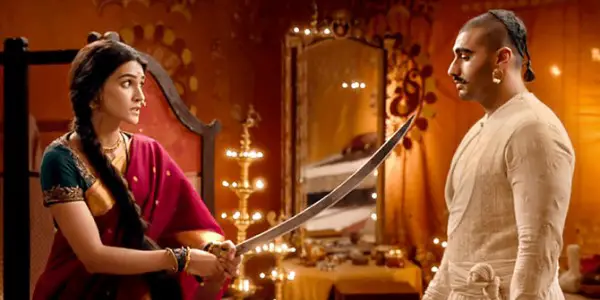
Then there’s Kriti Sanon who plays Parvatibai, the wife of Bhau, a role that gives the actress little space to evolve as she replays the emotional arcs from previous films as a merry love interest whose destiny is tightly tied to wherever the man ends up. The intent for this dramatised version of Parvatibai to be an avatar for strong Maratha women is clear at the start but, as more and more characters enter the fray, she’s often resigned to standing silently by her man.
What could’ve been a worthy historical epic with all the visual ingredients and an interesting historical foundation in place is ultimately just a tired expression of Bollywood nationalism, with bad acting to boot.
Mardaani 2 (Gopi Puthran)
Last year, Rani Mukerji found herself in hot water after she was invited to an actress roundtable and essentially blamed victims in a discussion about #MeToo, stating that vulnerable women need to change themselves and have the courage to fight back because they have to take responsibility for themselves before expecting men to. When Deepika Padukone retorted by questioning why we needed to bring it to a point where girls should learn self-defence, Mukerji doubled down by suggesting compulsory martial arts lessons in school.
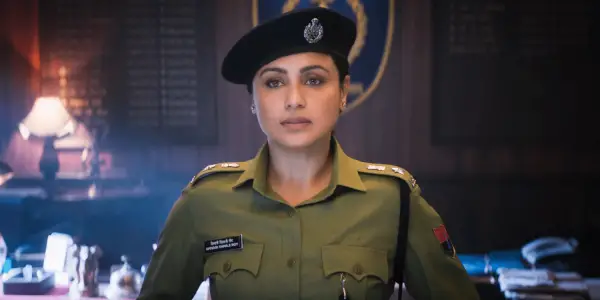
So, it’s very ironic to see her revisit her acclaimed cop character DCP Shivani Shivaji Roy for a Mardaani sequel where she attempts to hunt down a serial killer who’s out there raping and murdering young women. Puthran’s screenplay seeks to prove Mukerji’s own points wrong by pinning the blame on a structural problem of patriarchy, feeding her hero with dialogue such as “Women shouldn’t have to introspect alone – the whole of society needs to”.
This is in a scene when Shivani, in the midst of a long, public hunt for the criminal, discusses India’s rape epidemic with a talk show host who thinks that the rape crimes could’ve been avoided if a male officer was leading the hunt instead of a policewoman. Mukerji is a very talented actress whose cop avatar is so far away from the c*cksure fashionista that sat at Rajeev Masand’s roundtable that day.
There are times when Mardaani 2 appears to be Mukerji’s outlet for seeking forgiveness from the public – like the talk show scene cited above – through a story that shines a light at the very real crisis of sexual violence in the country. When Shivani breaks down uncontrollably sobbing at the end of the movie, it feels like the actress has learnt how ill-advised her words were.
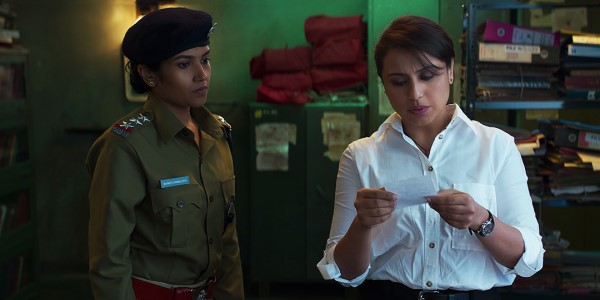
It’s impossible for me to divorce my response to Mardaani 2 from Mukerji’s comments but, separating the art from the artist, Mardaani 2 is an impressive procedural thriller that pits Mukerji‘s ass-kicking, quick-witted, iron-willed, no-nonsense detective against a cold-blooded, phone-jacking, identity-stealing, child-murdering, unhinged serial rapist. The devil in the flesh, he outsmarts the cops at every step through chameleonism and even literally gets under their nose when posing as a mute tea boy. His only Achilles heel appears to be his asthma.
This sick bastard is Sunny, played by young TV actor Vishwal Jethwa, who steals the film wholesale from the lead actress, coming out as the breakthrough performer of the year. He breaks the fourth wall with his piercing green eyes to deliver chilling monologues and possesses an effortless ability to channel the multiple personalities that his villain adopts. Jethwa is too good at his job – I would instinctively hate him if I saw him in person.
The film opens with him stalking and tricking a girl into believing her boyfriend has had a car accident. He offers her a ride to the hospital and brutally assaults her, leaving her for dead. Whilst some films uncomfortably continue to use rape as a plot point, this one has no choice but to do so, taking a step further by confronting us with the thoughts of people like the aforementioned talk show host and a callous colleague who believes “these modern types” of women are “asking for it”. Shivani’s fight isn’t just a physical one – it’s a mental one, as she constantly challenges gender bias.
As gripping as Mardaani 2 is, it’s also grim as hell, with brutal imagery of women’s scarred and bruised faces. I can understand the argument against such visuals, but Puthran’s intention of reflecting reality virtually forces him to execute his film in such a way. Naturally, it ends with shocking statistics of sexual violence in India and a blunt warning that things need to change. This film is a worthy conversation starter and an admirable act of redemption for its star.
Dabangg 3 (dir. Prabhu Deva)
I loved Dabangg and enjoyed the second one more than most. Dabangg is a Bollywood masala inspired by the style of Robert Rodriguez‘s El Mariachi trilogy and the hysterical mockery of physics in Stephen Chow’s comedies, fronted by a muscular superstar who isn’t afraid to do a little dance in the middle of a brawl and a great soundtrack. You can’t ask for much better Bollywood escapism.
Dabangg 2 offered more of the same – sometimes more of the exact same – but I would have happily taken that again because, unfortunately, Dabangg 3 ruins the series. Gone is the charming mix of homage and self-parody of Salman Khan’s screen image as this bloated threequel opts for uncharacteristically puerile humour and general unpleasantness. There are a few moments of promise – when the successful elements on the previous films remain intact – but they’re ultimately outweighed by the number of disgraceful ones.
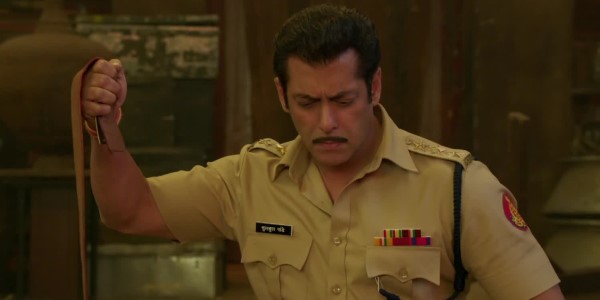
Let’s begin with the length. Clocking in at 158 minutes, this one is considerably longer than the previous instalments. It could’ve been appropriate seeing as this is supposedly the final film – it could’ve been an intimation of an epic showdown between the hero Chulbul Pandey (Khan) and his greatest foe yet Bali Singh, a figure from the past who changed Chulbul’s destiny forever, played by the formidable Kannada actor Sudeep. As it turns out, though, the running time is padded out by more non-sequiturs than a season of Family Guy, with extended gags ranging from bigoted to plain lame.
As always, the story begins Chulbul beating up bad guys, this time a gang of thieves at a wedding. As always, they don’t really matter in the grand scheme of things – we just need a quick fix of action to kick the film off. After a fairly boring catch-up with the returning characters – his wife Rajjo (Sonakshi Sinha), his brother Makkhi (Arbaaz Khan), his father Prajapati (Pramod Khanna) – he embarks on a bewildering side mission where he slaps a woman twice for not respecting other women (she runs a prostitution racket) before we’re finally introduced to the real villain.
Bali Singh’s introduction is intense – coolly poised, he overlooks the makeshift graveyard of a dead enemy. Interrupted by one of his goons with news of his jailed goons, he’s put on a video call with the policeman who arrested them. Of course, it’s Chulbul Pandey, whose eyes widen when he sees the screen. On the other line, Bali simply grimaces and says “Dhakkad Pandey… we’ll meet.”
At that point, strapped in for a prequel as much as a sequel, I was getting ready to declare Bali the best Bond villain that wasn’t in a 007 movie. You really believe Chulbul may have met his match in a villain who can tap into his psyche, like Scarecrow to Batman. Sadly, the backstory is absolutely atrocious. It turns out that Bali is just a sad incel who was jealous that Chulbul dated a pretty girl when they were young. Chulbul, by the way, is a nickname inherited from said girl.
The absolute worst part is that in the extended flashback sequence, that love interest is played by 20-year-old actress Saiee Manjrekar whilst the 54-year-old Khan and 45-year-old Sudeep continue to play the younger versions of themselves. But nobody is buying it – it’s beyond creepy seeing them lust over the baby-faced actress, and worse seeing one of them succeed. As awful as the decision to not recast younger actors is, they didn’t even consider digitally de-aging Salman to at least make the age difference look just a little bit less mortifying.
Dabangg’s action sequences were a joy to watch for their sheer defiance of space and time, produced only through a slick edit, including heavy use of bullet time. Under a new director and editor, the creativity declares bankruptcy early on – nothing will stick in my memory like the image from the first film of Chulbul throwing a guy in front of a speeding train and pulling him back before impact, as if he’s playing with a human whip.
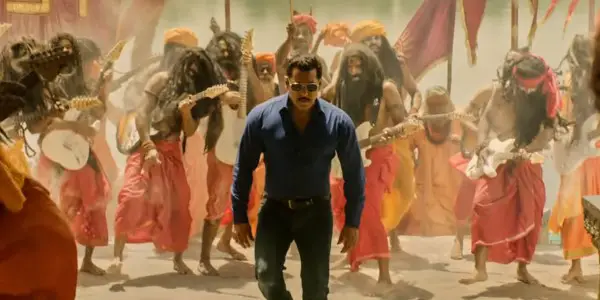
Considering this is the same series that gave us the bangers Munni Badnaam Hui, Fevicol Se and Hud Hud Dabangg, what might be worse than the unremarkable action is the mediocre soundtrack. The songs are not only indistinguishable within the T-Series sphere but indistinct from even themselves. Beloved rapper Badshah cashes in on nostalgia with a remix of Munni entitled Munna Budnaam Hua and it’s completely forgettable.
When all’s said and done, the door to a fourth film is left open because Mr Khan may need to come back and feed the cash cow if all else fails. The ending implies a follow-up would take a very different shape though, so, as it stands, this is the end of a cycle and a highly disappointing conclusion to a trilogy that started off with Dabangg and ends with Dawhimperr. First Game of Thrones, then Star Wars and now this – can we leave the underwhelming finales behind us for the next decade, please?
Good Newwz (dir. Raj Mehta)
I will profess to not really be a supporter of Akshay Kumar. Not like the fourth highest paid actor in the world needs my allegiance – his films are critic-proof – but his contemporary career is marred by an obligatory need to align his work with the nationalistic ideologies of the ruling political party, the BJP. Recently he claimed to have accidentally liked a tweet that mocked students attacked by police violence during the ongoing CAA protests. Few people thought he sincerely liked it “by mistake”.
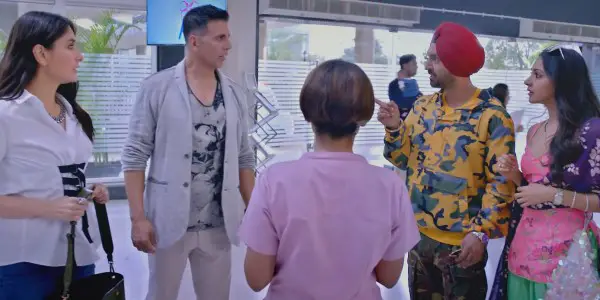
Good news – for two hours and fifteen minutes you forget you’re watching a government shill. Here’s a script that never lets Kumar gets self-indulgent whilst maintaining his ethos of promoting dialogue on social issues, which he normally struggles to do without inserting pro-BJP propaganda. Good Newwz is a delightful comedy about two couples striving for children through in-vitro fertilisation with fab performances from the four leading stars.
Both couples share the surname Batra: there’s the affluent Varun (Kumar) and Deepti (Kareena Kapoor), who we primarily focus on, struggling to conceive, with his smoking and drinking habits said to have damaged his sperm. Then there’s Honey (Diljit Dosanjh) and Monika (Kiara Advani) whose sex life we don’t know to the same extent but are the type to talk about their bedroom antics in public. Hyperactive and speaking a million miles a minute, they have an energy that overwhelms the others. The pair don’t meet each other until 45 minutes into the movie and the conflict begins when they discover each other’s sperm has been swapped during IVF.
With strong fashion senses from all four individuals and the freedom to move apartments implying a similar economic class, the only major difference between the couples seems to be the extent of their education. Monika is constantly pronouncing words wrong and Honey can’t speak English, a requisite for understanding the procedures described in detail by their doctors Dr. Anand Joshi (Adil Hussain) and Dr. Sandhya Joshi (Tisca Chopra), who are an item themselves.
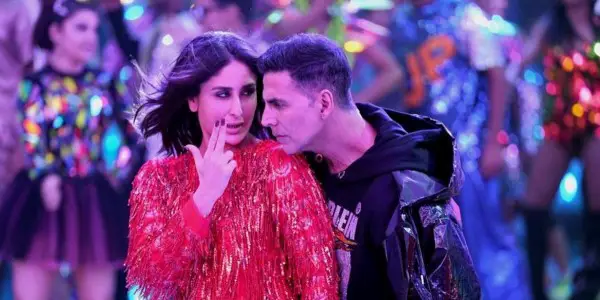
Whilst Kumar doesn’t throw in a subtle line about why Modi’s social programmes are so great, this isn’t a film without commentary. The politics over here, domestic, revolve around the decision to have a baby after the sperm mix-up. At times it broaches weird pro-life territory, with passionate monologues on why a child is worth keeping when Varun and Deepti start hesitating about their preparation for an unrelated baby – you can feel the screenwriter holding his pen back from directly writing “abortion is wrong.” Somebody should have prevented the songwriters from penning a random item number about Zumba, though.
Kareena Kapoor is totally lovely as the most grounded character, the one who doesn’t operate on impulse and genuinely cares about the health of both the child and the parents, warming up to Honey and Monika in an affront to her husband. However, she might be too selfless, continuing her work as a journalist when she’s heavily pregnant and causing concern for biological father Honey.
Akshay Kumar’s Varun gets most of the funny lines and awkward moments but also all of the irritating ones too, taking too much pleasure in poking fun at the opposing couple’s apparent lack of intelligence. Dosanjh and Advani are a miracle act, both hilariously euphoric for the most part but terrifically switching to dramatic mode when things get heavy as Monika’s pregnancy becomes complicated. The inevitable late tonal shift is well conceived, a respite from the broad comedy to focus on the harrowing, real difficulties of childbirth.
Overall, I’m happy the year of Bollywood cinema closed with an easygoing comedy that finds both genuine humour and pathos in a high-concept premise that’s entirely possible in real life. Good Newwz is by far the best film released in 2019 to feature any of the four central actors. Here’s hoping they continue to pick pleasurable projects in the new decade.
Next Month
And that concludes the December 2019 edition of Bollywood Inquiry! The new decade kicks off with an assortment of differing films, from another Maratha war epic (Tanhaji) to a 3D dance movie (Street Dancer 3D) to a Deepika Padukone-starring acid attack survivor biopic (Chhapaak). Personally, I’m most excited for sports drama Panga, following a high-level kabbadi player preparing to make a comeback. Check out the trailer below and stay tuned for next month’s column.
You can read previous Bollywood Inquiry editions here.
Which Bollywood films are you looking forward to in 2020? What were your favourites of 2019? Let us know in the comments below.
Does content like this matter to you?
Become a Member and support film journalism. Unlock access to all of Film Inquiry`s great articles. Join a community of like-minded readers who are passionate about cinema - get access to our private members Network, give back to independent filmmakers, and more.
Musanna Ahmed is a freelance film critic writing for Film Inquiry, The Movie Waffler and The Upcoming. His taste in film knows no boundaries.













